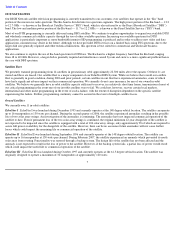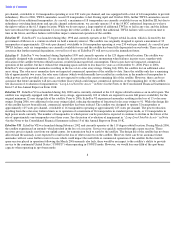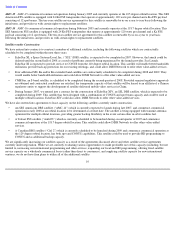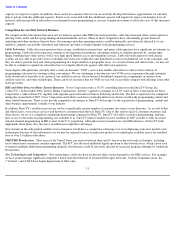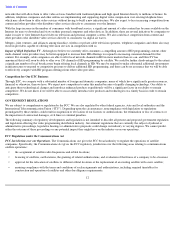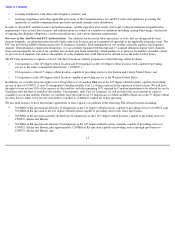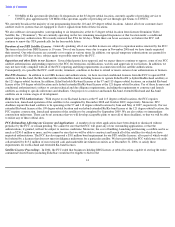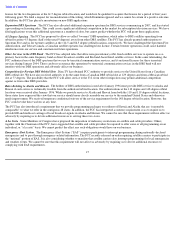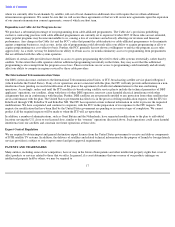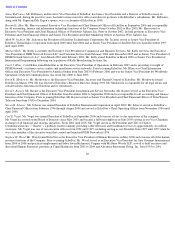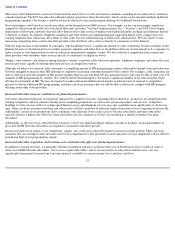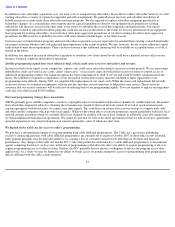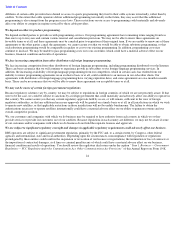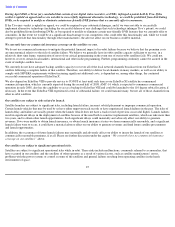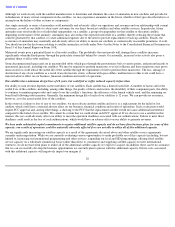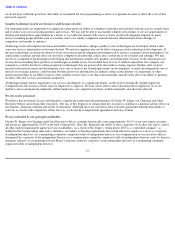Dish Network 2007 Annual Report Download - page 24
Download and view the complete annual report
Please find page 24 of the 2007 Dish Network annual report below. You can navigate through the pages in the report by either clicking on the pages listed below, or by using the keyword search tool below to find specific information within the annual report.
Table of Contents
where we currently offer local channels by satellite, roll-out of local channels in additional cities will require that we obtain additional
retransmission agreements. We cannot be sure that we will secure these agreements or that we will secure new agreements upon the expiration
of our current retransmission consent agreements, some of which are short term.
Dependence on Cable Act for Program Access
We purchase a substantial percentage of our programming from cable-affiliated programmers. The Cable Act’s provisions prohibiting
exclusive contracting practices with cable affiliated programmers are currently set to expire in October 2007. If those rules are not extended,
many popular programs may become unavailable to us, causing a loss of customers and adversely affecting our revenues and financial
performance. Any change in the Cable Act and the FCC’s rules that permit the cable industry or cable-affiliated programmers to discriminate
against competing businesses, such as ours, in the sale of programming could adversely affect our ability to acquire programming at all or to
acquire programming on a cost-effective basis. Further, the FCC generally has not shown a willingness to enforce the program access rules
aggressively. As a result, we may be limited in our ability to obtain access (or nondiscriminatory access) to programming from programmers
that are affiliated with the cable system operators.
Affiliates of certain cable providers have denied us access to sports programming they feed to their cable systems terrestrially, rather than by
satellite. To the extent that cable operators deliver additional programming terrestrially in the future, they may assert that this additional
programming is also exempt from the program access laws. These restrictions on our access to programming could materially and adversely
affect our ability to compete in regions serviced by these cable providers.
The International Telecommunication Union
Our DBS system also must conform to the International Telecommunication Union, or ITU, broadcasting satellite service plan for Region 2
(which includes the United States). If any of our operations are not consistent with this plan, the ITU will only provide authorization on a non-
interference basis pending successful modification of the plan or the agreement of all affected administrations to the non-conforming
operations. Accordingly, unless and until the ITU modifies its broadcasting satellite service plan to include the technical parameters of DBS
applicants’ operations, our satellites, along with those of other DBS operators, must not cause harmful electrical interference with other
assignments that are in conformance with the plan. Further, DBS satellites are not presently entitled to any protection from other satellites that
are in conformance with the plan. The United States government has filed or is in the process of filing modification requests with the ITU for
EchoStar I through VIII, EchoStar X and EchoStar XII. The ITU has requested certain technical information in order to process the requested
modifications. We have cooperated, and continue to cooperate, with the FCC in the preparation of its responses to the ITU requests. The
requests for modification that have been filed by the United States government are pending or in various stages of completion. We cannot
predict if all the required requests will be made or when the ITU will act upon them.
In addition, a number of administrations, such as Great Britain and the Netherlands, have requested modifications to the plan to add orbital
locations serving the U.S. close to our licensed slots, similar to the “tweener” operations discussed above. Such operations could cause harmful
interference into our satellites and constrain our future operations at those slots.
Export Control Regulation
We are required to obtain import and general destination export licenses from the United States government to receive and deliver components
of DTH satellite TV systems. In addition, the delivery of satellites and related technical information for the purpose of launch by foreign launch
services providers is subject to strict export control and prior approval requirements.
PATENTS AND TRADEMARKS
Many entities, including some of our competitors, have or may in the future obtain patents and other intellectual property rights that cover or
affect products or services related to those that we offer. In general, if a court determines that one or more of our products infringes on
intellectual property held by others, we may be required to
17


